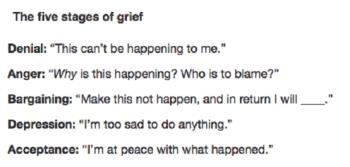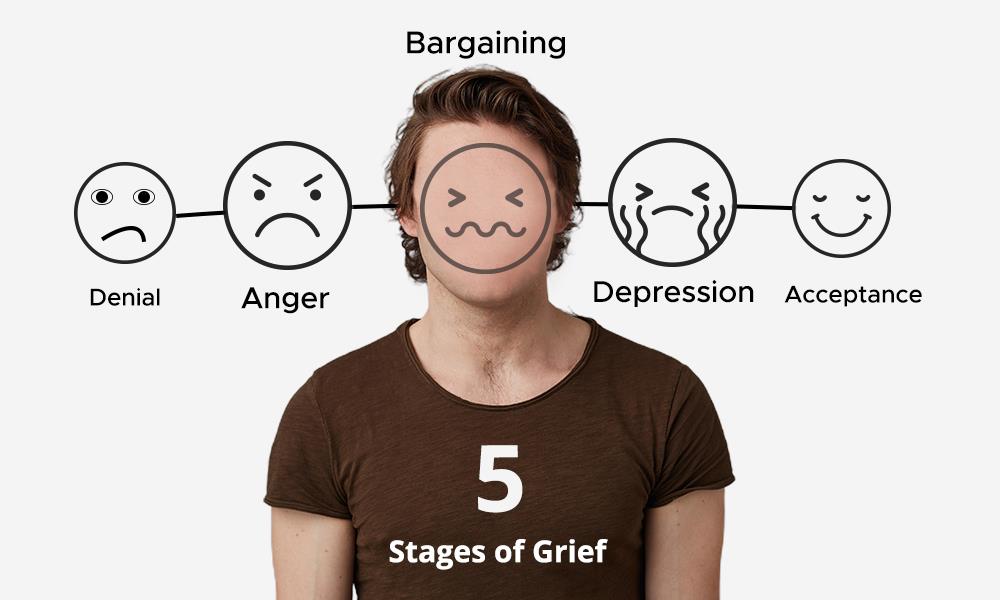Save 25% On Your First Autoship Order
Save 25% On Your First Autoship Order

Grieving, especially for a spouse, is not a one-size-fits-all process. This is especially applicable to those who have been the primary caregivers to their spouses. The emotional toll can be incredibly high. While we may think that there is a “playbook” for the proper way to grieve after such a monumental loss, that thinking is actually flawed. We here at HPFY may be able to shine a light on the grieving process that you may find helpful.

Just like each person is different from others, everybody grieves differently, but grief is a natural process and you may experience emotions ranging from sadness or loneliness to even anger or rage. Regardless of your loss, you can move on and heal if you understand your emotions and seek support or help if needed. The Kubler-Ross model identifies some general steps in the grieving process and they can include:
While the Kubler-Ross model presents five clear steps for grieving, it is important to realize that each person grieves differently than another. As you can notice, there is no timeframe for each step and somebody in the grief process may experience each step at a different rate. Some may get through it quickly while others may process the loss significantly slower.

In many cases, the primary caregiver at home is a spouse. Often these caregivers experience guilt after the death of their spouse. You often hear phrases such as “if only I had done something different” or “if I had only spoken up” as we look back when dealing with a spouse’s death. We frequently can get the concepts of guilt and regret mixed up. Here’s a good rule of thumb:
These are just one way of defining these two terms. You may or may not agree with what I have just put forth but understand these are two completely different emotions. Be sure not to confuse the two during your grief process.
Okay, once you have experienced acceptance everything will be peachy, right? Well not exactly. It is inevitable that we will be reminded of our loss from time to time. Whether it is the anniversary of their death, a birthday, or another important moment you shared, there will be reminders of them and your loss. These reminders can even be triggered by sight, scent, and sounds that can bring on a flood of emotions. This can trigger a wide range of emotions such as anxiety, guilt, sadness, and loneliness to name just a few. The Mayo Clinic suggests several steps to take during these tough moments. They include:

Grieving for a spouse is an amazingly intimate time and you may run the full gamut of emotions during this time. It is not a sign of weakness to show that we are sad or lonely, but part of the natural healing process of grief. Don’t run or hide from your emotions, embrace them so that you can come out of it healthy and maybe happier!!
Disclaimer: All content found on our website, including images, videos, infographics and text were created solely for informational purposes. Our content should never be used for the purpose of diagnosis or treatment of any medical conditions. Content shared on our websites is not meant to be used as a substitute for advice from a certified medical professional. Reliance on the information provided on our website as a basis for patient treatment is solely at your own risk. We urge all our customers to always consult a physician or a certified medical professional before trying or using a new medical product.

Kevin Cleary has been a Health Products For You contributor for many years and has a degree in marketing. His health and wellness journey has a very personal meaning and has guided him in his content writing for HPFY.
In 2006, ...
How To Increase Iron Levels Quickly
It’s a question that must have puzzled you like many others. Iron is essential in hemoglobin production and its inadequate levels can negatively impact your health. Dive into this informative article to explore top iron-rich foods that can help you fight iron deficiency.
10 Best Coccyx Cushions for Tailbone Pain
If you're like most people, you spend about 8 to 10 hours sitting every day. However unhealthy, it is part of life for many, and can cause tailbone pain. Coccyx cushions can help alleviate this pain. Click to read more and find the perfect coccyx cushion for your tailbone pain.
5+ Best Adult Diapers for Fecal Incontinence
Dealing with fecal incontinence can be challenging, but you're not alone. Read this article and navigate through discreet and effective solutions that help you manage fecal incontinence and let you live life on your terms with confidence and comfort.
Top 5 Best Reviewed Nebulizers of 2024
Need an effective and affordable nebulizer? Look no further, in this article we offer 5 of our best reviewed nebulizers that are loved by our customers. Click to read more and find the perfect nebulizer for all your respiratory needs.
10 Best Penis Pumps For Erectile Dysfunction
For anyone dealing with erectile dysfunction, penis pumps serve as a great way to manage it. But with so many products available, determining the best one for your needs can be challenging. To assist you in refining your choices and making an informed decision, here are our top 10 options, recognized for their effectiveness and safety.